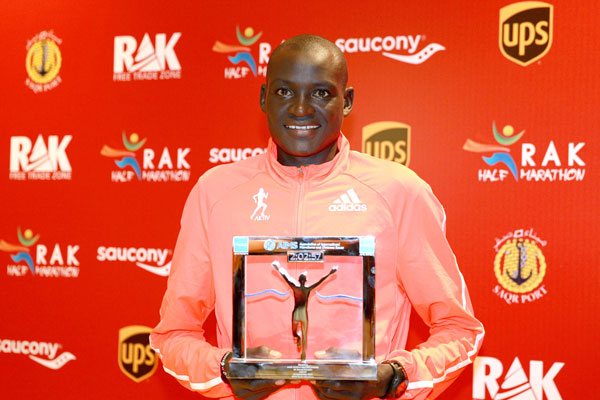The world running organisation the Association of International Marathons and Distance Races (AIMS) is delighted to announce that the Kenyan athlete Dennis Kimetto has been awarded the AIMS World Record Award in recognition of his World Record breaking time of 2:02:57 set in the BMW Berlin Marathon on 28 September 2014.
Today (Thursday 12 February 2015) in Ras Al Khaimah (UAE), Dennis’s achievement was given global recognition during a presentation at the Race Village of the Ras Al Khaimah (RAK) Half Marathon. Dennis was presented with his award on the eve of the RAK Half Marathon, where he is a guest of honour. The presentation was jointly made by AIMS General Secretary Hugh Jones and Race Director of the RAK Half Marathon and AIMS Continental PR Manager for Asia Nathan Clayton.
Kimetto (31) broke the World Record at the BMW Berlin Marathon, recording a time 26 seconds faster than the previous World Record set by his compatriot Wilson Kipsang in the same event in 2013.
Dennis’s time of 2:02:57 has been officially recognised as the World Record by the IAAF (International Association of Athletics Federations) and by AIMS (Association of International Marathons and Distance Races which represents over 380 distance running events in 103 countries and territories). AIMS set the world record criteria for performances on the road later adopted by the IAAF.
AIMS have been awarding athletes in recognition of World Record breaking performances since 1985. This is the second time that Dennis has been given an award by AIMS. His outstanding performances throughout 2014 were recognised with the AIMS Best Marathon Runner Award in November 2014 at the AIMS Gala Dinner sponsored by OPAP in the home of the marathon, the city of Athens, Greece.
Race Director of the RAK Half Marathon and AIMS Continental PR Manager for Asia Nathan Clayton comments: “I am delighted that Dennis’s world record breaking time is being recognised by AIMS and that this award presentation is happening on the occasion of the RAK Half Marathon. We would like to thank AIMS and their sponsors for choosing our event to host this prestigious ceremony.”
AIMS President Paco Borao comments: “We are delighted to present Dennis with this award on behalf of the 380 AIMS members in 103 countries and territories throughout the World. Dennis is a great athlete and we are pleased to recognise his record breaking achievement with this award.”
Dennis Kimetto comments: “I am very proud to be recognised by AIMS and their members around the world with this award. I would like to thank AIMS and their sponsors for presenting me with this prestigious award.”
AIMS proposed the technical criteria for World Records on the road that the IAAF has adopted for prescribed distances.
The full conditions to be satisfied are:
a) The event must be sanctioned either by the IAAF and/or the National Federation and conducted under IAAF Rules.
b) The athlete achieving the IAAF Road World Record must be eligible to compete under IAAF Rules.
c) The course must be measured by an “A” or “B” IAAF/AIMS approved measurer as defined in IAAF Rule 240.3.
d) The start and finish points on a course, measured along a straight line between them, shall not be further apart than 50% of the race distance.
e) The decrease in elevation between the start and finish shall not exceed an average of one in a thousand, i.e. 1m per km.
f) Either the course measurer that certified the course or another “A” or “B” measurer in possession of the complete measurement data and maps must validate that the course measured was the course run by riding in the lead vehicle.
g) The course must be verified on site (i.e. within two weeks before, on the day of the race or as soon as practical after the race), preferably by a different IAAF/AIMS “A” measurer from the one that did the original measurement.
h) The athlete must undergo a doping control on the date of the race.
i) For the Road Relay, the race should be run in stages of 5km, 10km, 5km, 10km, 5km, 7.195km.
Road World Records set at intermediate distances within a race must comply with the above conditions and be timed according to IAAF Rules. The intermediate distances must have been measured and marked during the course measurement.
It is recommended that Member Federations adopt the Rules of the IAAF for the conduct of their own athletic competitions.









